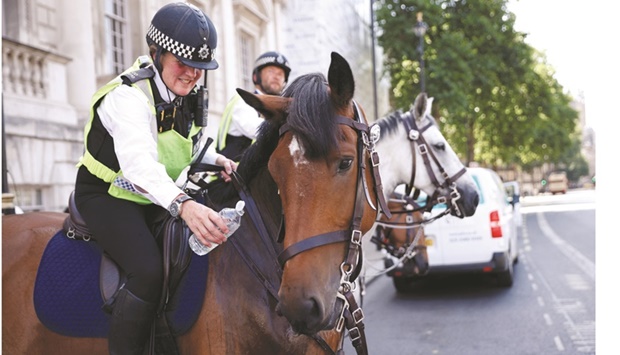Sales of electric fans, hoses, air conditioning units and sprinklers are soaring as Britons swelter amid record temperatures, retailers said.
Britain was braced for temperatures to hit 40° Celsius (104° Fahrenheit) for the first time this week, with ministers urging members of the public to stay at home as the heatwave caused train services to be cancelled, one London airport to shut its runway and some schools to close.
Sainsbury’s, Britain’s No. 2 supermarket group which also owns the Argos general merchandise business, said sales of fans last week rose 1,876% versus the week before, while sales of air conditioning units were up 2,420% and sales of paddling pools were up 814%.
Yesterday 10 out of the top 15 most-sold items in Amazon’s UK home and kitchen section were fans.
Other popular items included an ice tray and “cooling gel insert” for pillows, according to Amazon.co.uk’s “best sellers” Web page.
Department store group John Lewis said sales of fans and air conditioning units were up 709% year-on year.
Home improvement retailer B&Q, which is owned by Kingfisher, said sales of hoses and sprinklers had more than doubled this week compared to a typical week, while sales of hot tubs had nearly tripled.
Builders merchant Travis Perkins’ Toolstation business said sales of fans jumped 641% from the week before as tradespeople struggled to stay cool.
It said sales of smart technology that controls temperatures leapt 95%, while sales of hoses had increased by 56% and sales of water cans by 21%.
Supermarkets have also reported soaring sales of ice cream, drinks, BBQ charcoals and sun care products.
However, analysts said that on balance, the heatwave is generally bad news for physical retailers as it is too hot to shop, adding to pressure on a sector already struggling with a cost-of-living crisis.
Market researcher Springboard said shopper numbers, or footfall, across all UK high streets was down 7.3% up to 1000 GMT yesterday compared to last week.
Britain’s government has triggered a “national emergency” alert as temperatures were forecast to surpass the previous record of 38.7C (102F) in the Cambridge University Botanic Garden in 2019.
Yesterday, the temperature nudged 38C in southern England and a new high was recorded in Wales, according to Britain’s Meteorological Office.
It is expected to be even hotter today, when the 40C level is forecast to be exceeded.
“We’ve got a difficult 48 hours coming,” Kit Malthouse, a minister in charge of government co-ordination, told BBC radio.
The heat brought widespread travel problems.
London’s Luton Airport said flights were suspended after a surface defect was found on the runway, and the heat caused flights to be diverted from the Royal Air Force’s Brize Norton air base.
The airport said its runway had reopened at 1705 GMT, after earlier suspending flights at 1522 GMT.
The airport had said in a post on Twitter that flights were suspended to allow for “an essential runway repair after high surface temperatures caused a small section to lift”.
The airport, located around 35 miles north of central London, is used by airlines including EasyJet, Wizz Air, Ryanair and TUI.
Some 14 flights due to land at Luton were diverted to other airports including Gatwick and Stansted, according to FlightRadar24 data.
The national rail network urged passengers not to travel unless necessary, with some services – including a key route between northeastern England and London – not running.
London’s metro network imposed temporary speed restrictions, meaning it would run a reduced service with journeys taking longer than normal.
Jake Kelly from Network Rail said he hoped normal operations would resume tomorrow, when temperatures are forecast to fall, but that would depend on “the damage that the weather does to the infrastructure over the next couple of days”.
The government has urged schools to stay open but many were due to close earlier than usual, normal uniform demands were ditched and end-of-term sports days were cancelled.
Some schools were shut, resorting to lockdown-style online lessons.
The public were warned not to swim in open water to cool off, with police reporting two teenagers had died after getting into trouble while swimming in a lake and a river.
Some factories also brought their opening hours forward, to prevent workers on the hottest jobs, such as welding, from falling ill.
At least one major zoo, at Chester, said it would close for two days, while in parliament, normal rules that require lawmakers to wear jackets or ties were eased.
The Health Security Agency (UKHSA) raised the heat health warning to Level 4 for England for the first time ever, while the Met Office issued its first ever extreme heat ‘Red warning’.
A Level 4 alert is used when a heatwave “is so severe and/or prolonged that its effects extend outside the health and social care system. At this level, illness and death may occur among the fit and healthy, and not just in high-risk groups”.

People collect water from a fountain in London’s Green Park.

A member of the Queen’s Guard receives water outside Buckingham Palace in London.

